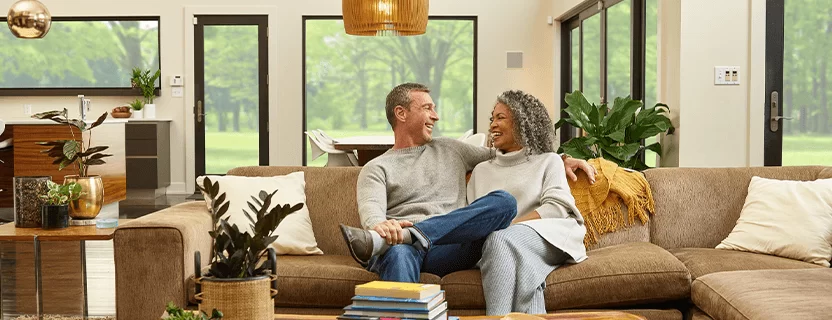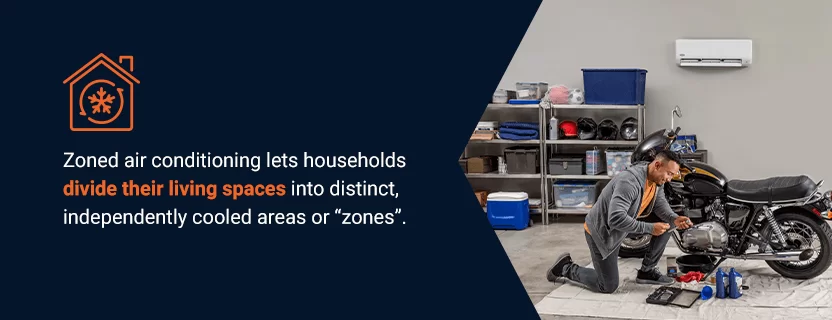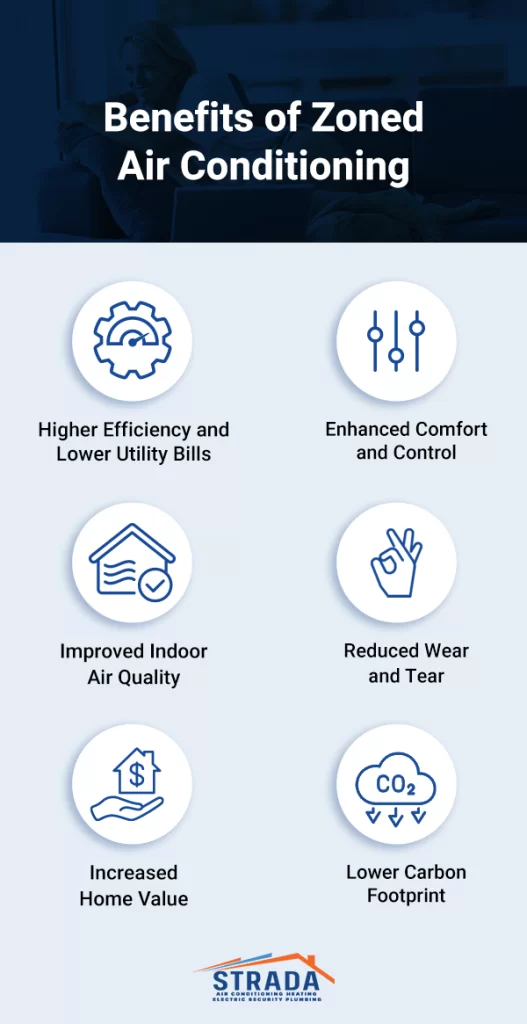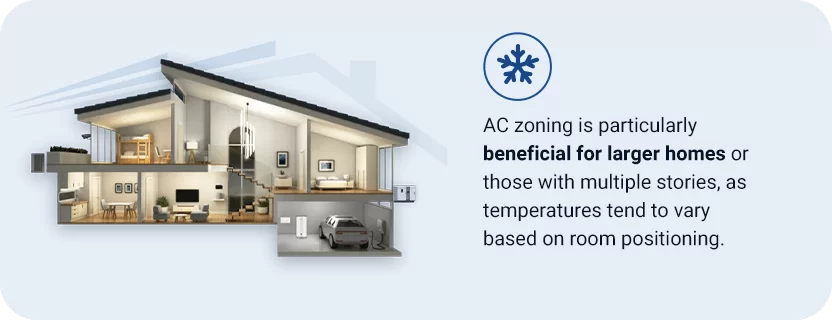
Each room in your house has different cooling needs. Insulation quality, sun exposure, size, occupancy, personal preference and many other factors influence what a space needs to reach optimal temperature. Fortunately, zoned cooling lets homeowners personalize their air conditioning (AC) for each room for maximum efficiency, comfort and control. Read on to learn which AC zoning solution will best complement your home.
Zoned air conditioning lets households divide their living spaces into distinct, independently cooled areas or “zones” instead of uniformly applying the same AC treatment to the whole house. This customized cooling happens via multiple indoor units called air carriers or by controlling airflow through ducts using motorized mechanical devices called dampers. Each zone requires its own thermostat to manage the air carriers and ducts according to your specifications.
Cooling isn’t the only thing your zoned air conditioning system can customize by region. You can also select room-specific humidity levels and connect your fans, air purifier and heating system to your thermostats to have year-round control over temperature, moisture, ventilation and air quality.

The type of AC zoning you need to have installed in your home depends on which heating, ventilation and air conditioning (HVAC) system you currently have or which one you plan to install new:
Homes with ductless mini-split systems require one outdoor unit connected to an array of mounted air carriers, also called “evaporator units.” Each zone will have its own air carrier and thermostat to customize temperature and other metrics for that specific area. Ductless mini-split systems are generally quieter and more energy-efficient than central ACs and require no ductwork, making them an excellent choice for retrofitting older homes without preexisting vents or smaller living spaces.
Many central air conditioning or HVAC systems distribute cooled air throughout the building via a network of ducts of varying sizes. Each zone is equipped with its own thermostat that controls dampers within the ducts. These dampers regulate airflow by adjusting how much air is allowed to pass through based on that zone’s cooling needs. This system results in fewer visible units than mini-split systems, although duct installation can be more invasive and complex.
Like traditional ducted zoning systems, variable air volume (VAV) systems utilize a central air handler to cool and distribute air through ducts. Instead of relying solely on motorized dampers, VAV systems feature advanced VAV boxes. These boxes include internal damper mechanisms alongside fans, air volume modulators and automatic controls that adjust the airflow rate in real time according to each zone’s specific temperature requirements.

Besides the obvious benefits that any air conditioning system provides, zoned ACs offer a unique set of advantages, including:
Because zoned air conditioners only send cooled air to the parts of the house that need attention, less electrical energy is wasted chilling unnecessary spaces. Rooms that are naturally colder due to their location or insulation can be set more conservatively, reducing the electricity used. The more efficient your HVAC system is, the more you’ll save on utility bills at the end of the month.
Pro tip: Pairing a zoned AC setup with a few smart thermostats can save you even more money at the end of the month. Set your smart thermostats to automatically account for room and house occupancy, outside weather, peak usage hours, humidity and other variables.
Some like their bedrooms rather chilly, while others prefer a toastier ambient temperature. With zoned cooling, you can give both household members what they want by designating them into different zones. Many modern zoned systems also use variable speed compressors that adjust their output based on the humidity level in each zone. This allows for more efficient dehumidification without overcooling, which is particularly beneficial in humid climates like Florida and surrounding states.
Excessive humidity levels can lead to mold and mildew growth, posing health risks and damaging property. This is especially true in southeastern states like Florida and Mississippi, where air moisture is high. Zoned AC systems can help mitigate these potential risks by effectively managing humidity in various zones. Controlling humidity can also reduce allergens such as dust mites and mold spores, helping to enhance the indoor air quality and create a healthier living environment for residents, pets and visitors.
Maintenance is an essential part of AC ownership, and zoned cooling systems can help make ownership more cost-effective by cutting down wear and tear. Since the system operates only in certain zones at any given time, it lessens the HVAC unit’s overall run time. This output prioritization can lead to less damage over time, reduce necessary tuneups and repairs and potentially extend the equipment’s life span.
If you choose to sell your home, prospective buyers will undoubtedly appreciate the extra comfort, efficiency, convenience and customization your house’s zone air conditioning can provide. If stuck choosing between a property with standard one-setting central cooling and a residence with dozens of cost-effective configurations to choose from, yours will have a clear advantage.
Zoned air conditioning systems let you select which rooms need what level of cooling. If a room doesn’t need as much energy dedicated to it, you can adjust your zoned setup to account for this. That way, you use less electricity, thereby reducing how much greenhouse gas emissions power stations emit on your behalf. If many AC-dependent homes switch to energy-efficient zoned ACs, it can significantly help the environment.
Similarly, the more sparingly you use energy to cool your home, the less pressure populations exert on the power grid that keeps homes and businesses running. If the demand for electricity during peak usage times becomes too great, it can lead to grid overloads, power outages or even blackouts. Zoned air conditioning systems let homeowners and renters reduce their energy consumption by cooling only what is necessary, making for a more reliable energy supply in the long term.
Although zoned ACs come with numerous upsides, there are still some critical aspects to consider before committing to a specific type, including:
Zoned HVAC systems typically require a higher initial investment than traditional systems, although this can be seen as an opportunity for long-term savings. The upfront costs include equipment like multiple thermostats, dampers and installation labor. While these expenses might seem significant initially, they can lead to lower energy bills and improved comfort in your home over time. It’s wise to view this as an investment that pays off through enhanced efficiency and a more comfortable living environment.
Working with a qualified HVAC professional will help you navigate the installation smoothly. They will assess your current setup and recommend solutions that work best for you. Once installed, ensuring proper calibration for each zone will enhance performance and keep your home cool and cozy year-round.
Selecting the right zoning system for your home is essential for maximizing comfort, efficiency, and overall satisfaction with your HVAC setup. Here’s a comprehensive guide to help you make an informed decision based on specific characteristics of your home:
AC zoning is particularly beneficial for larger homes or those with multiple stories, as temperatures tend to vary based on room positioning. Homeowners with this type of living setup can leverage AC zoning by installing separate thermostats for each area or adjusting dampers, customizing each room’s HVAC settings for its particular needs. Larger homes also usually have higher utility bills, which you can mitigate with smart zoning decisions.
For open-plan homes, zoning air conditioning solutions like variable air volume systems can dynamically manage airflow across large spaces and prevent hot or cold spots. Occupants of smaller homes and apartments may find that a centralized system can comfortably maintain a consistent ambient temperature throughout the space. If specific rooms experience significant temperature variations, however, consider a ductless mini-split system.

When considering a zoned air conditioning system, your existing ductwork significantly influences the best solution for your cooling needs. If you already have a duct network, ducted zoning with variable air volume systems is an excellent option, as you already have the basic infrastructure for VAV. If your home doesn’t have preinstalled ductwork or can’t accommodate new duct installation, a ductless mini-split zoned air conditioning system is typically the better choice.
If you plan to do major renovations or build a new home, especially one with a large, multistory or open-concept design, consider integrating ductwork from the outset so you have multiple options for AC zoning once construction is done. Consult with an HVAC specialist when having your ductwork installed so you can pick the right size pipes and position each duct and vent in the optimal, most convenient spot for your home’s unique layout.
Whether you have a ducted or ductless setup, looking after your zoned air conditioning system is pivotal for optimal performance and longevity. Habits you can develop to preserve the efficiency and life span of your HVAC equipment include:
It’s advisable to have your cooling system inspected by professional HVAC technicians at least twice yearly, preferably during the fall and the spring. That way, you can ensure your equipment is prepped and ready for temperature drops and spikes expected in winter and summer. Pick a contractor with experience in zoned air conditioning who will spot little signs of wear and tear early and repair them before they require large-scale replacements or cause significant performance dips.
Air filters are an important part of your cooling system. They trap dust, dirt and pollen circulating in the air, reducing pollutants, odors and allergens in your home. They also help protect AC equipment from wear and tear and improve efficiency if regularly changed. Filter replacement is crucial to keeping utility bills low and performance quality high. Changing dirty, clogged air filters at least every three months with clean new ones can boost your AC’s efficiency by as much as 15%.
Air filters are located in different regions of the HVAC system, depending on the type, and require varying treatment to keep clean:
Your thermostats act as the nervous system for your air conditioner, so they need to be well taken care of for the rest of the system to run as expected. For ductless mini-split systems, ensure you’ve calibrated each zone’s thermostat to best fit the area it serves, updating the settings as seasonal changes affect the temperature and humidity. Find out if and when you need to change your thermostat’s battery from the manual or the contractor installing it and follow those recommendations.
For best results, AC owners can schedule recurring inspection, tuneup and maintenance visits from HVAC experts in their area. These convenient annual or semiannual maintenance plans often come with parts and equipment discounts and benefits that save you money and improve your system’s efficiency and longevity. Tuneups include many exclusively professional services, from coil and duct cleaning to refrigerant pressure tests, blower inspections and more.
If you’re ready to boost efficiency and comfort while reducing energy wastage with a zoned air conditioning system, Strada Air Conditioning & Heating is here to help, from initial installation to ongoing maintenance. We’re committed to delivering exceptional, professional services and top-quality products to our valued clients across the southeastern United States, and we’d love to have you onboard.
Since 2003, our team of expertly trained HVAC specialists and technicians has provided cooling, heating, electrical, security and plumbing solutions for the ultimate integrated experience. Whether you’re building your new home and want to install ductwork, planning on upgrading your existing system, want to schedule a maintenance plan, need expert repairs and parts or are simply looking for guidance on the next steps in home comfort, reach out to us online today and find your solution.